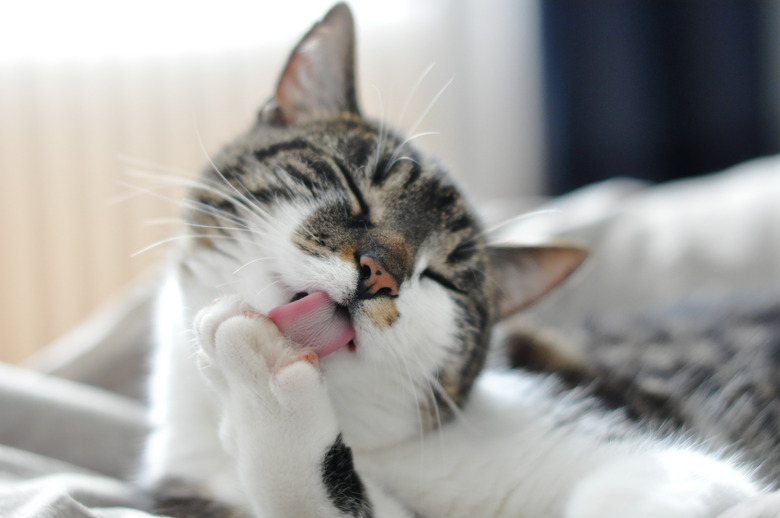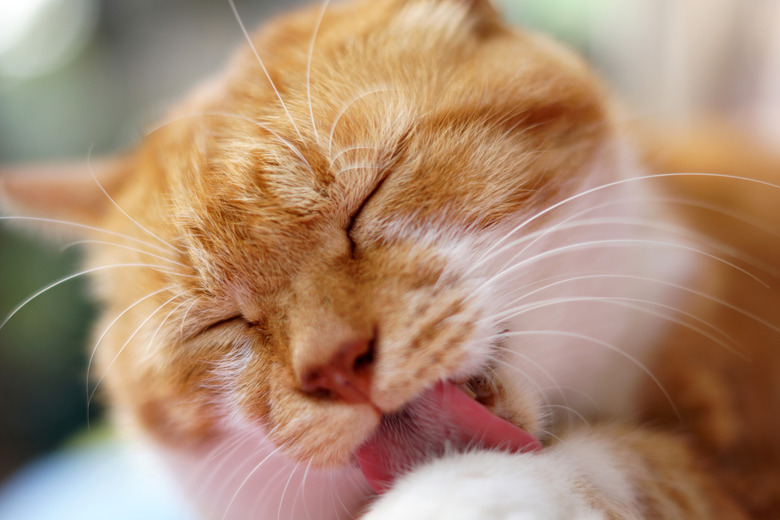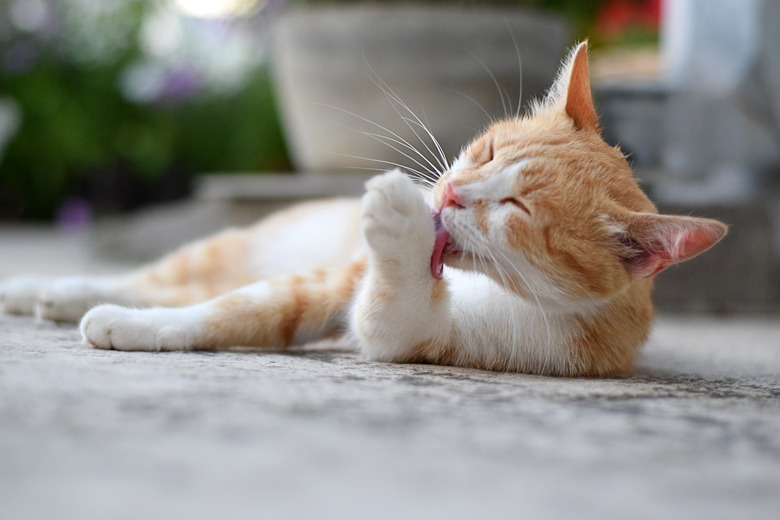What To Do About A Cat Who Is Overgrooming One Spot
Fastidious grooming is one of the unique distinguishing characteristics of felines. Few animals attend to their personal cleanliness to quite the same impeccable degree. For cats, grooming is, in fact, a necessity. It is their modus operandi, as inborn as purring.
But have you noticed your cat grooming one particular spot excessively? Is he off his food, or has he stopped playing, all because he's too busy grooming? Does he have you wondering if his grooming has become obsessive? Don't ignore it. It may be time to consult with your veterinarian. There's a good chance that a physical, psychological, or behavioral problem is at the heart of his compulsion to groom.
When is grooming too much?
When is grooming
too much?
Pamela Perry, DVM, animal behavior resident of the Animal Behavior Clinic at Cornell University's College of Veterinary Medicine explains that cats groom about 30 to 50% of their day. Grooming is a natural behavior for cats and some have a tendency to groom more than others. But this too can be normal. Depending on its frequency and duration, grooming is only considered excessive or obsessive when it distracts the cat from her regular routine and daily functions, such as eating, playing, sleeping, and interacting with the family.
Obvious physical signs of problematic overgrooming are bald patches, abnormal appearance to the skin, and damaged or stubbly fur shafts.
What causes obsessive grooming?
What causes
obsessive grooming?
Unfortunately, there's no quick, easy diagnosis or solution to the problem of a cat licking herself too much. First of all, as any cat lover knows, cats are complex creatures and getting to the root of any feline problem is often just as complicated. Is it stress, is it allergies, is it parasites, or is it hyperthyroidism or a neurological disorder? There are so many potential reasons for obsessive grooming. Only your veterinarian will be able to give you a definitive diagnosis, so it's time for a consultation.
Medical or physical disorders need to to ruled out first, and itchiness and irritation, known as dermatitis or miliary dermatitis, are a common cause of excessive grooming in cats. And it's the first reason that comes to mind when a cat is licking one particular spot excessively. Itchiness is caused by an assortment of parasites, among them fleas, skin mites, and roundworm, a fungus which can prompt persistent licking and/or scratching. Your vet will do a thorough physical examination and run lab tests to aid in her diagnosis.
Allergies to fleas, food, or something in the environment such as pollen will also cause a cat to groom too much.
After all the underlying medical reasons for overgrooming have been excluded with bloodwork and lab tests, excessive licking is considered a behavioral issue. And when it comes to cats, the usual suspect is stress. Stress causes tension and it makes us frustrated and nervous, and it's a big deal for cats. So prone to stress are cats, and from such a wide, if not endless, range of stressors, that "nervous as a cat" and "jumpy as a cat" have become part of our everyday language along with other cat idioms like cat nap, copycat, and scaredy cat.
Stress-related grooming is known as psychogenic alopecia, an obsessive-compulsive behavior where the cat cannot stop licking and chewing on herself. It is a destructive form of kitty stress relief.
Excessive grooming complications
Excessive grooming
complications
In addition to damaging their fur, the cat who overgrooms may cause trauma to his skin with his rough tongue at the licking site causing lesions. And secondary bacterial infections can develop in the overworked skin and may need to be treated with topical or oral antibiotics.
Too much licking also causes hairballs, significant hair loss, and the resulting bald skin is prone to sunburn and frostbite. Infection won't occur as long as the licking doesn't break the skin. but if infection does set in, the licking will intensify and could lead to a vicious cycle with even more serious infection possible.
Curbing excessive grooming when it's behavioral
Curbing excessive
grooming when it's behavioral
All-too-familiar to pet owners, the Elizabethan collar comes in handy for those times when your cat needs to be restrained from licking or biting at incisions or from licking topical medications. It's also beneficial for when you have a cat who has been diagnosed with behavioral obsessive grooming. First to curb and break the cycle of grooming, and also to prevent those nasty skin infections caused by overgrooming.
Always check with your veterinarian before changing your pet's diet, medication, or physical activity routines. This information is not a substitute for a vet's opinion.


